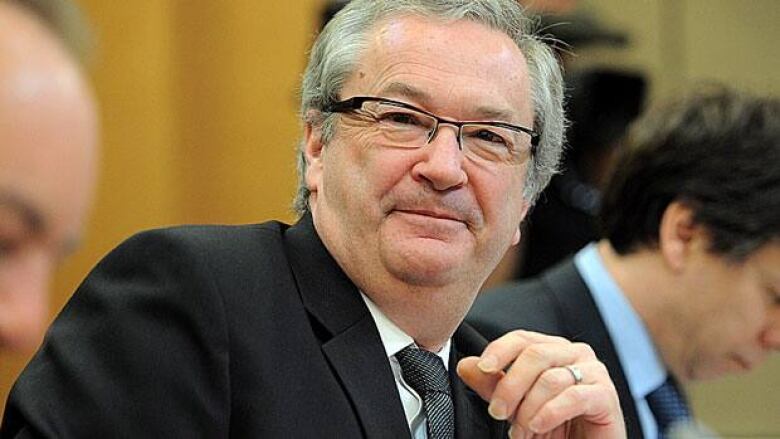Robocalls abuse requires new laws, election chief says
Chief Electoral Officer Marc Mayrand says he'll recommend changes to Canada Elections Act

Canada's top election official says he wants to see the law changed to deal with deceptive phone calls.
Chief Electoral Officer Marc Mayrand says he will recommend to Parliament that the Canada Elections Act be updated to fight those deceptive calls, like the live and automated robocalls made in Guelph, Ont., that sent voters to the wrong polling station in the last federal election.
Mayrand says new technology has changed how parties and candidates communicate with voters.
"These technologies are not in themselves problematic and in fact can and are used in positive ways to reach out to electors. However, I am concerned now that they can be misused during an election and, in fact, easily misused. As we have seen this past year, deceptive telephone calls, both live and automated, have arrived on our electoral landscape. And their use will have an impact on how Canadians view the electoral system," he said in a speech in Ottawa on Tuesday.
Mayrand says Canadians are rightfully offended by news reports about possible electoral fraud related to campaign phone calls, and need to know there's a process in place to address the problems.
"In this regard, I will be bringing forward recommendations to ensure that the Canada Elections Act has the right measures to deal with this new reality. I feel strongly that an electoral system and an electoral law that do not reflect the concerns and values of a modern Canadian electorate will only in the long-term help fuel disillusionment and disengagement from political process. That is why modernizing the Canada Elections Act speaks to our needs to maintain the integrity of the electoral process," Mayrand said.
Complaints about misleading phone calls in the 2011 election have now grown to 1,300 in more than 200 ridings, he said. Last March, he said it was about 800 complaints.
Not the first call to give Elections Canada more power
Mayrand wouldn't provide any more details on the changes he'd like to see to the laws, saying he has to share them with Parliament first. He is expected to report by the end of March 2013.
"One of the things we have to look [at] is how efficient are those laws," he told reporters after the speech.
The chief electoral officer can't change the law. He reports to Parliament through the committee on procedure and House affairs, which can issue a report to the House of Commons endorsing his recommendations.
Last winter, the committee heard from Mayrand that he wanted the power to force political parties to turn over receipts and other documents supporting their spending, much like candidates have to do after an election campaign.
Conservative MPs, who have a majority of seats on the committee, didn't support the recommendation. NDP MPs on the committee issued a dissenting report backing Mayrand's request.
Interim Liberal Leader Bob Rae says the changes Mayrand wants are necessary. But he says there's also a need to link breaches of the law more closely to the need for byelections.
"One of the great ironies of the act is that you can have a lot of breaches of the Elections Act and there are no consequences other than a slap on the wrist. It does not affect your holding of a seat. If you want to get a new byelection you have to go to court and that's a separate process from the Elections Canada process. I think somehow these two processes need to be brought together — the court process and what happens with Elections Canada, and that's a change I'd like to see," Rae said.
A former Liberal MP is awaiting a Supreme Court decision that could result in a byelection. Borys Wrzesnewskyj lost the Etobicoke Centre seat to Conservative MP Ted Opitz on May 2, 2011. Wrzesnewskyj won on Ontario Superior Court decision to force a byelection after the judge threw out a number of ballots, but Opitz appealed to the Supreme Court of Canada.
NDP House Leader Nathan Cullen also agrees with the need for an updated Canada Elections Act.
"Technology has changed the way that Canadians interact with politics and elections, and if we need to give Elections Canada more tools to deal with anybody who's trying to mislead Canadians or corrupt the election process, then we absolutely need to give them those tools."
Legislation coming 'in due course'
The motion called for legislation to:
- Give Elections Canada stronger investigative powers, including the ability to force political parties to provide supporting documents for their expenses.
- Require all telecommunication companies that provide voter contact services during a general election to register with Elections Canada.
- Make telecommunication companies identify and verify the identity of election clients.
The March 12, 2012, vote gave the government a deadline six months later, Sept. 12, 2012. New Democrat David Christopherson said at the time that while the motion wasn't binding, there would be "hell to pay" if the government didn't act.
Asked about it last week, the minister of state for democratic reform said a proposal would be coming "in due course."
"A comprehensive proposal will be put forward shortly," Tim Uppal said.
Read a recap of Kady O'Malley's live blog below.
Mobile users, read the live blog here.